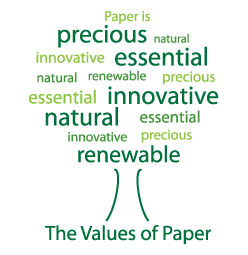Today, Vice-president Antonio Tajani, European Commissioner for Industry and Enterprise, presented a Communication on a renewed industrial policy - "An industrial policy in the globalisation era: putting competitiveness and sustainability at centre stage". Together with the other EU2020 initiatives, this Communication aims to boost growth and create additional employment in Europe through improving the framework conditions for European industry and facilitate the transformation towards a low carbon economy, mastering globalisation and innovation.
The European paper industry welcomes the Commission’s Communication and its acknowledgement that industry is indeed the base of the new growth model for Europe. The pulp and paper industry - an eco-industry delivering bio-based products - is engaged in and contributes to the transition to low-carbon and resource-efficient EU economy.
To be competitive, Europe, through its renewed industrial policy, must actively support a level playing field for EU industry in a global market. CEPI welcomes the sectoral approach that can bring specific solutions to energy-intensive industries.
“It is essential that the industrial competitiveness dimension is included in all EU policies”, said Teresa Presas, CEPI Managing Director. All policy measures on a national and European level should go through the “competitiveness-proofing” highlighted in the Communication, respect better-regulation and internal-market principles. They must also reflect an integrated approach for dealing with competitiveness, energy and environmental issues in a sustainable and cost-efficient way.
Technology and key enabling technologies are rightly identified as key drivers for industrial policy to deliver greener and socially inclusive growth. A strong and supportive research framework that steers innovation in European industrial sectors is a key precondition for European competitiveness.
As correctly mentioned in the Communication, an integrated and ambitious EU industrial policy can succeed only if it is broadly supported by EU institutions, Member States and stakeholders.
CEPI aisbl - The Confederation of European Paper Industries
The Confederation of European Paper Industries (CEPI) is a Brussels-based non-profit making organisation regrouping the European pulp and paper industry and championing this industry’s achievements and the benefits of its products. Its mission is to promote the member’s business sector by taking specific actions notably, by monitoring and analysing activities and initiatives in the areas of industry, environment, energy, forestry, recycling, fiscal policies and competitiveness in general. Through CEPI, the paper industry increases its visibility and acts on emerging issues, making expert and constructive contributions on behalf of the industry.
Its collective expertise provides a unique source of information both for and on the industry; coordinating essential exchanges of experience and knowledge among its members, the ability to provide technical assistance to legislators and to identify independent experts on specific issues. Through its 19 member countries (17 European Union members plus Norway and Switzerland) CEPI represents some 750 pulp, paper and board producing companies across Europe, ranging from small and medium sized companies to multi-nationals, and 1080 paper mills. Together they represent 25% of world production.
Website: www.cepi.org
The value of paper, in its many forms, is at the core of society’s needs. Ensuring its future developments will allow it to realise its full potential. Five values show the benefits of the paper industry and its products to the European society:
o Paper is natural
o Paper is essential
o Paper is innovative
o Paper is renewable
o Paper is precious
Our industry is an example to others in its responses to current challenges, not least in mitigating climate change. We practice sustainable forest management, which captures CO2, pursue security of energy supply through renewable energy, and optimise resources through the highest recycling rates. We are a significant provider of employment, and add economic value through the constant harnessing and updating of new technologies.
Friday, 29 October 2010 11:30
Industrial policy: Competitiveness included in all EU policy
Ian Melin-Jones
Published in
Press Releases
Tagged under
